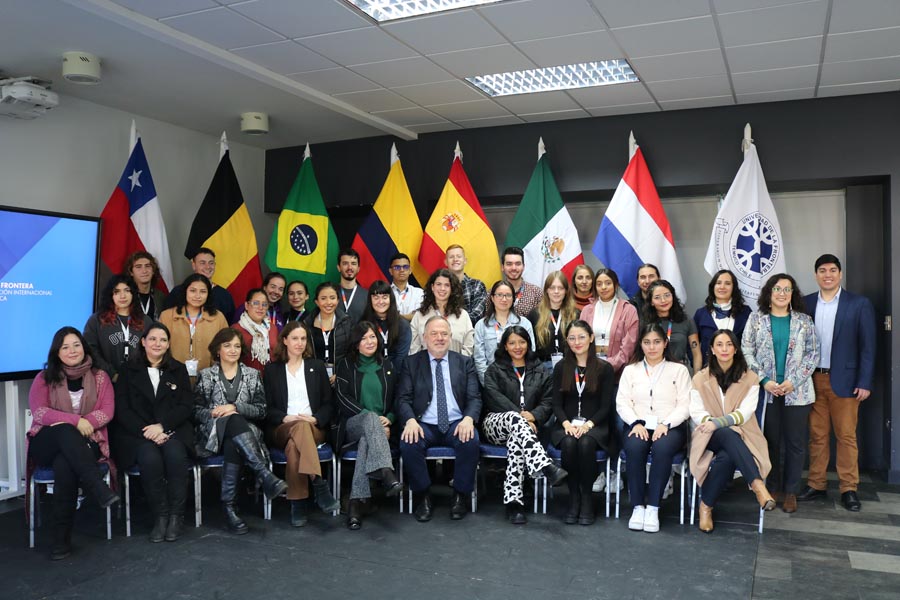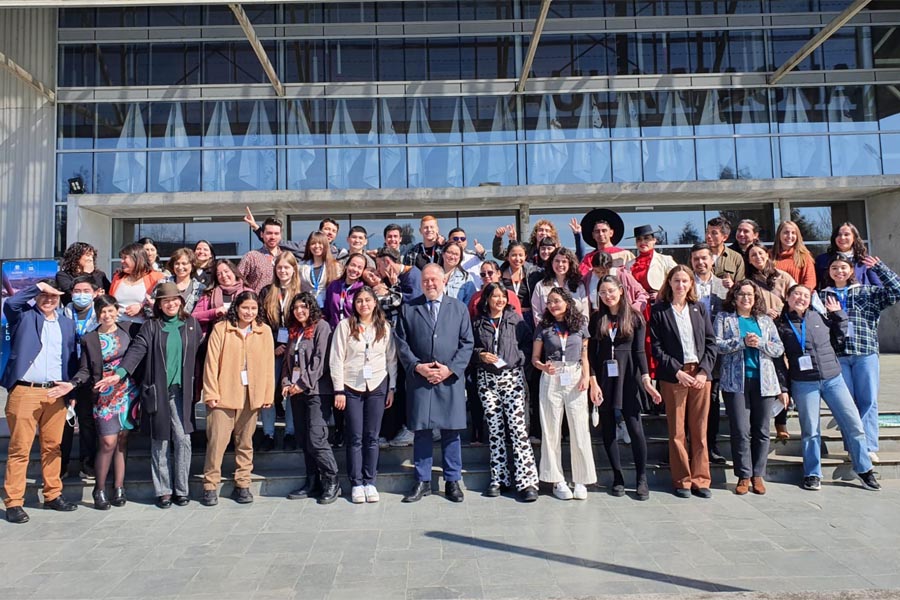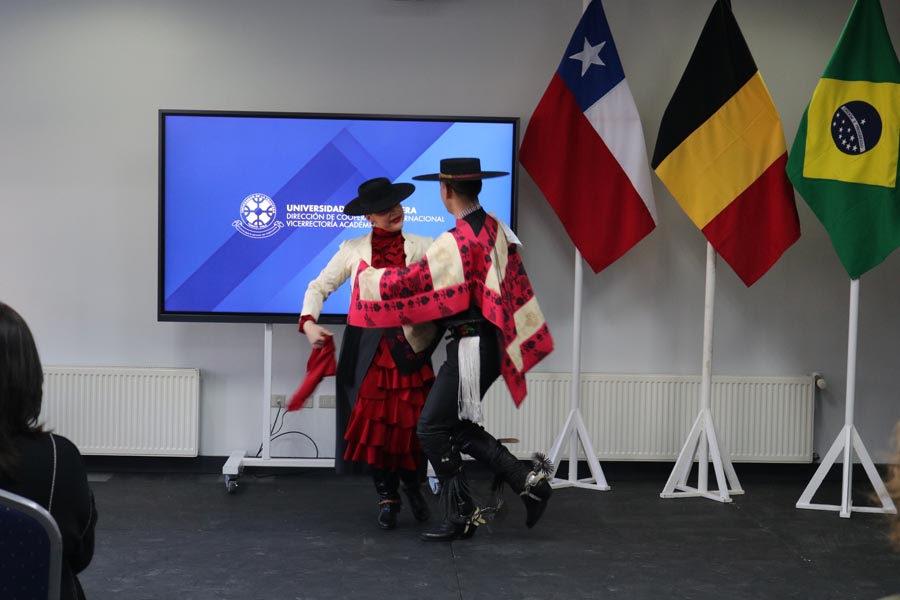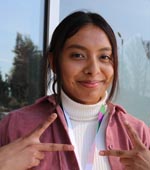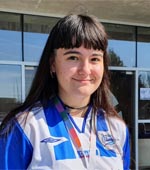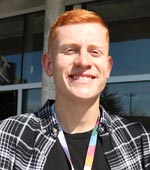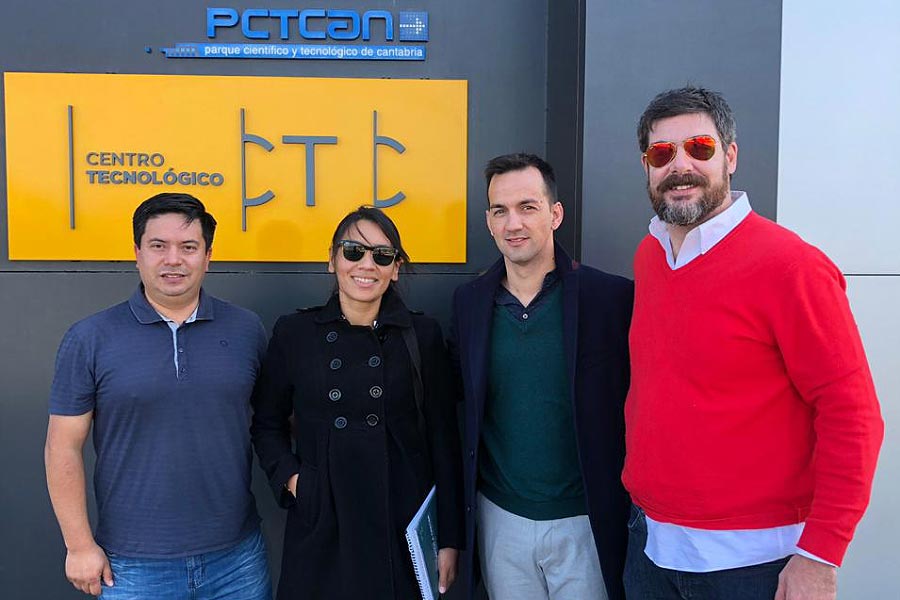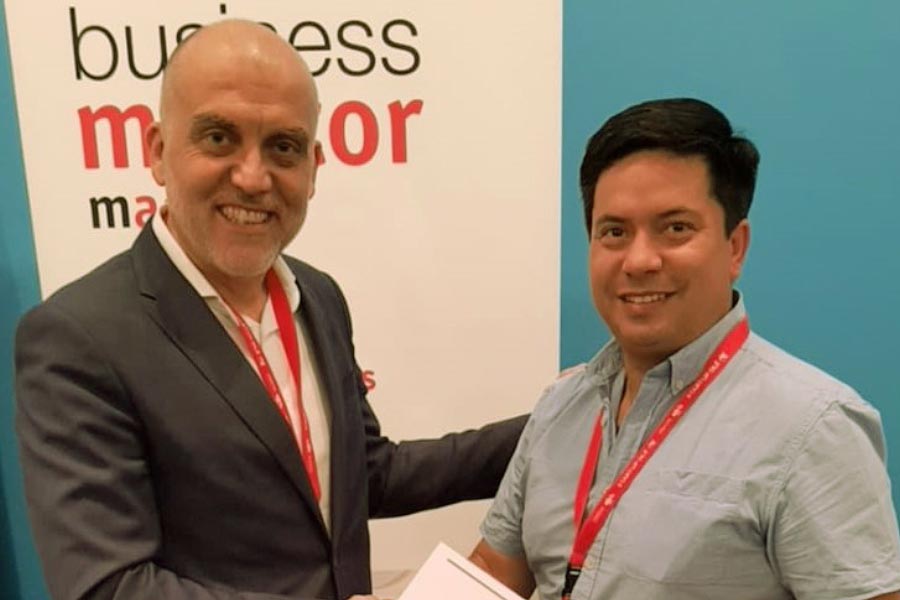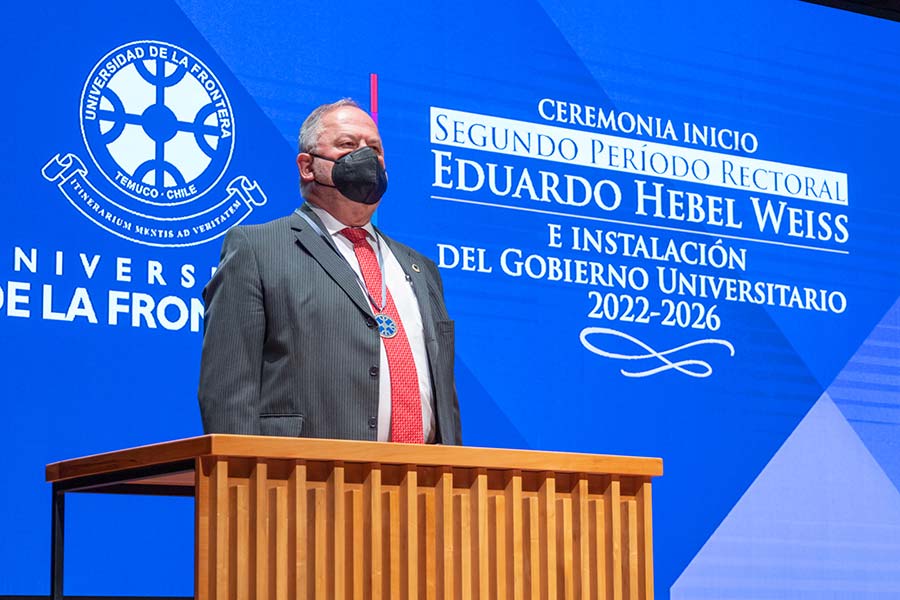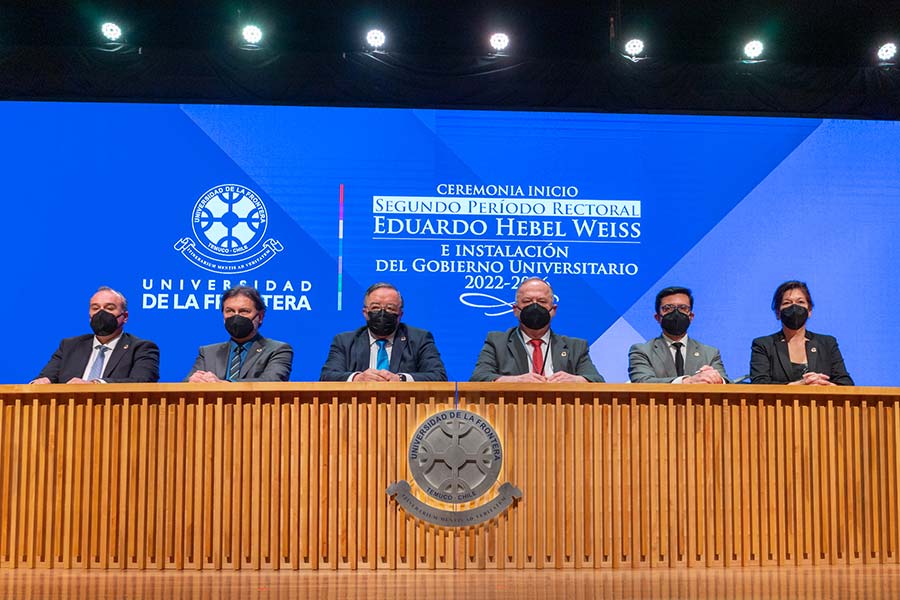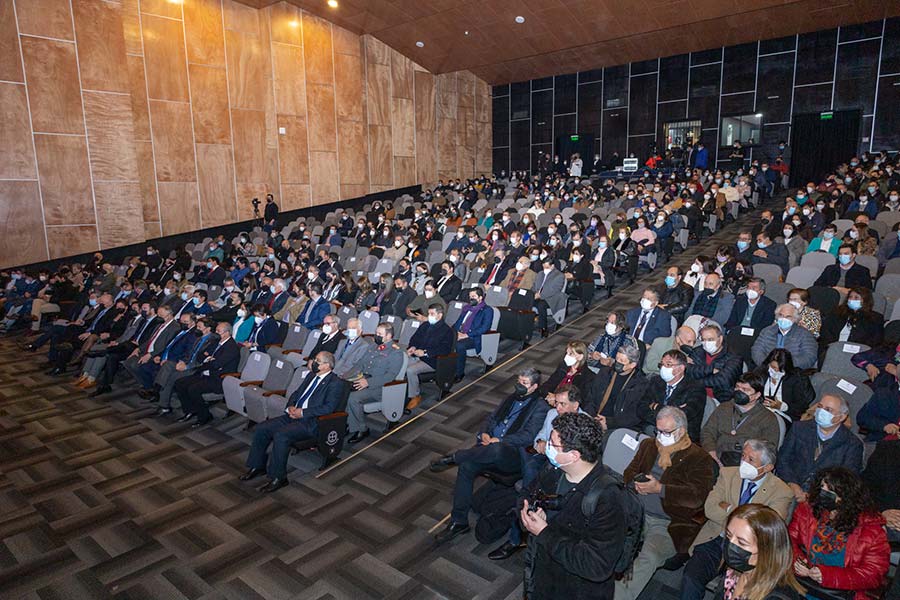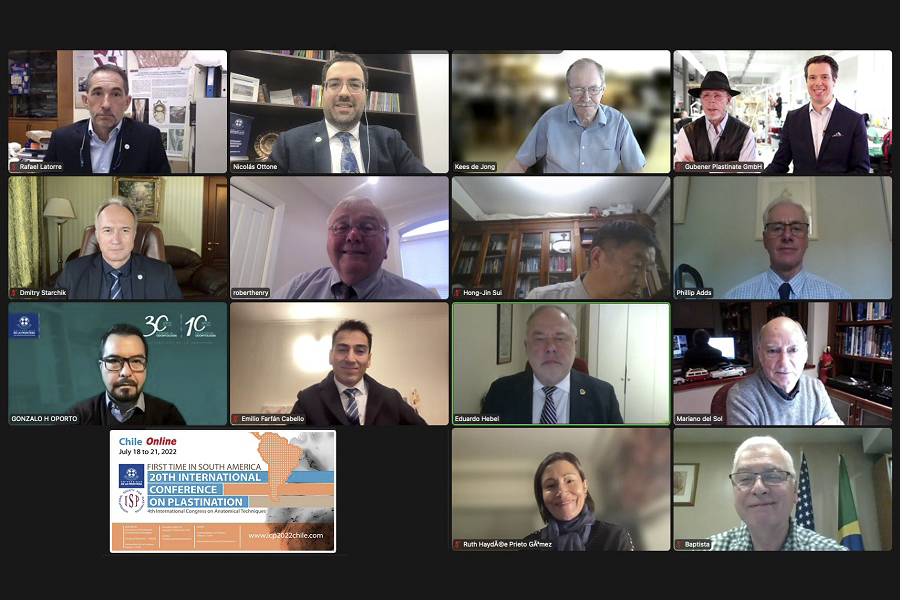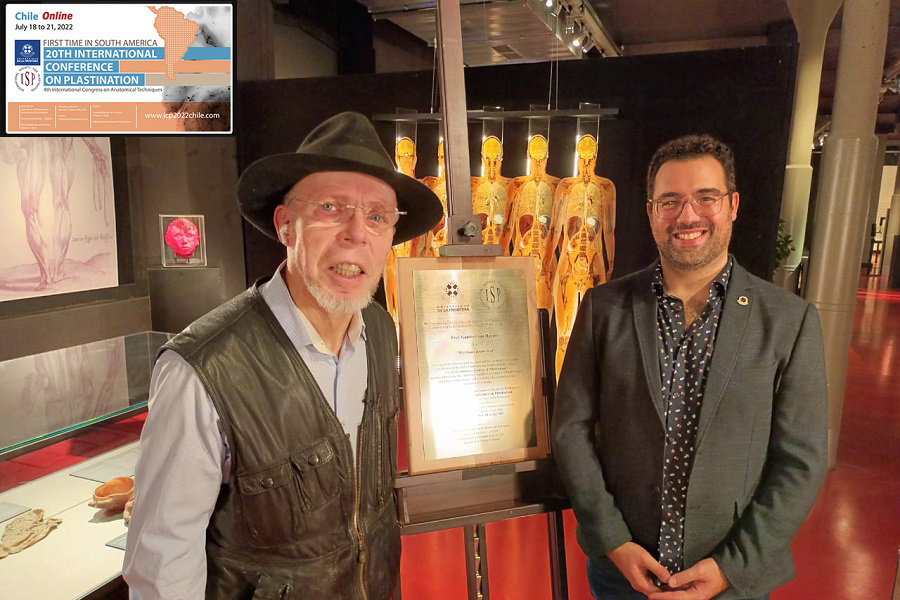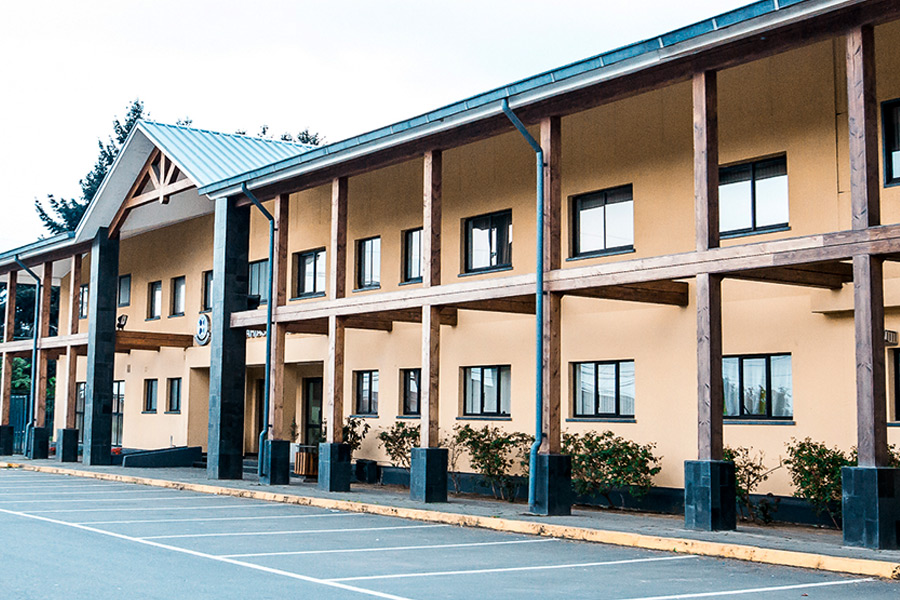|
Students from different parts of the world, such as Belgium, Brazil, Colombia, Spain, Slovakia, Mexico and the Netherlands, have arrived at Universidad de La Frontera, as well as students from other parts of Chile, who made use of the national mobility agreements between the universities of the Consortium of Universities of the State of Chile (CUECH). |
“It is always a motive of joy when we receive the young national and international students who chose our university for their studies,” said Dr. Eduardo Hebel Weiss, the rector of the Universidad de La Frontera (UFRO), at the welcome ceremony for the incoming students at UFROs Aula Magna. “Here in the south of Chile, they will be able to learn from the virtues and difficulties of our region and our territory. At the same time, they will be able to have an inspiring cultural experience at our university,” he added. Students from different countries in the world, such as Belgium, Brazil, Colombia, Spain, Slovakia, Mexico and the Netherlands, have arrived at UFRO, as well as students from other parts of Chile, who made use of the national mobility agreements between the universities of the Consortium of Universities of the State of Chile (CUECH). They will all spend the second semester of 2022 at UFRO. This new generation of young people came to UFRO reactivating the student mobility that had been carried out virtually during the pandemic. “We are getting back to our mobility in-person,” explained Lorena Vieli, the director of the International Affairs Office. “Today, young people have to be able to move in intercultural contexts and to be connected with the world. In this regard, the presence of students from other countries and cultural contexts at our university enriches the teaching and learning processes,” she concluded. The international students who join UFRO this semester will be spread across the different faculties and study programs, making use of the agreements and partnerships with leading universities all over the world. To make the arrival easier for this satisfactory number of students, the National and International Student Mobility Unit of the International Affairs Office uses a Buddy Program, which consists of volunteering national UFRO students who help the incoming students to get to know the university and the city, and to adapt. The welcome ceremony took place at the end of the official orientation week, with participation of the university authorities, the national and international students, the volunteers of the Buddy Program, and the folkloric dance group Magia Chilena, who presented the typical Chilean Cueca dance.
Written and translated by: UFRO Communications Office |
|
The business incubator of UFRO will participate at Startup Olé in Salamanca, Spain, where its incubated businesses will be able to establish new partnerships, attend business rounds, conferences and exclusive matchmaking activities with start-ups, scale-ups and key players of the international scenario, among other activities that directly benefit them. |
IncubatecUFRO, the business incubator of the Universidad de La Frontera (UFRO), will participate at Startup Olé Salamanca in Spain, from Monday, September 5, to Wednesday, September 7. It is Europe’s most important event in 2022 that will present international entrepreneurship and innovation and that Chile already collaborates with for several years. Cristian Campomanes Gutiérrez, the CEO of IncubatecUFRO, and Mario Núñez Arancibia, the representative for the Los Lagos Region in Chile, coordinate national start-ups that want to join and participate in the different categories of Startup Olé Salamanca, which allow them to establish strategic alliances with partners who are already familiar with the trajectory of the business incubator. “We were anxiously waiting for the return of Startup Olé Salamanca, one of the most important entrepreneurial platforms in the world, which we are joining as KeyPlayers, presenting technological start-ups that work with IncubatecUFRO, in order to establish successful partnerships that will expand the markets of our entrepreneurs towards Europe,” Cristian Campomanes explained. ACTIVITIES The business incubator will participate in different categories at Startup Olé Salamanca, such as the Reverse Pitch, where Cristian Campomanes, the CEO of IncubatecUFRO, will participate, or the Business Accelerator Roundtable, in which Mario Núñez, the representative for the Los Lagos Region in Chile, will participate. “We will participate in different categories with IncubatecUFRO, and we particularly stand out in the Reverse Pitch, where we will present what we do, our fields of work and the advantages to work with us. This opportunity will allow expanding the possibility to reach potential clients that will be present at this important event, focusing on Europe and Latin America. On the other hand, we will participate in the Business Accelerator Roundtable, together with other start-ups, where we can share experiences, analyze the global panorama as partners, and, of course, make our offer known,” Campomanes added. PARTICIPATING START-UPS IncubatecUFRO will have a stand at Startup Olé Salamanca to promote its work and connect with companies that are in the stage of consolidation or scaling, to generate spaces for networking. “We will participate with companies from the aquaculture industry at Startup Olé Salamanca. One of them is Aquadata SpA, a company that offers technological solutions and consultancy services for the market, in the fields of prophylaxis and treatment of diseases; and the other one is Fishcare, a company dedicated to the transport of live fish in trucks with a bigger load capacity and incorporated technology that prioritizes the well-being and safety of the smolts,” the CEO of the business incubator pointed out. The businesses that participate with IncubatecUFRO will have the chance to network in a relaxed atmosphere, to attend different talks and meetings with investors and corporations, to acquire knowledge in networking tools, to participate in pitch competitions, and to engage in activities that could be beneficial to their interests. It is worth mentioning that the start-ups that participate with IncubatecUFRO have a 50% discount on the event fee and access to discounted flights with the airline Iberia. For more information about the event, go to https://startupole.eu/ or contact This email address is being protected from spambots. You need JavaScript enabled to view it. for more information about the participating start-ups and the work of IncubatecUFRO.
Written by: Abelardo Silva García |
|
Dr. Eduardo Hebel was reelected on June third and takes office together with Renato Hunter Alarcón, the Vice-rector for Academic Affairs; Pamela Ibarra Palma, the Vice-rector for Undergraduate Affairs; Rodrigo Navia Diez, the Vice-rector for Research and Graduate Studies; and Jorge Petit-Breuilh Sepúlveda, the Vice-rector for Administration and Finances. |
“Four years ago, I received the honor to lead this university, and today, it is my duty to renew my commitment to each and every one of our university community,” said Dr. Eduardo Hebel Weiss during the ceremony in which he officially took office for the second term (2022-2026) as the Rector of the Universidad de La Frontera (UFRO). The ceremony took place at the university’s Aula Magna, in presence of local and regional authorities, former rectors of UFRO, rectors of other universities, and the university community. At the ceremony, the General Secretary, Dr. Plinio Durán, read the Presidential Decree, which officially appoints Dr. Eduardo Hebel Weiss the new Rector of the Universidad de La Frontera, who then signed the record of assumption of office and received the official Medal of the Universidad de La Frontera, which for each term is lend to the new rector. In his speech, Dr. Eduardo Hebel reaffirmed his main guidelines that motivate him to lead the university and that are based on the value of the human being, the recognition of diversity, empathy, solidarity and the unrestricted respect for the people. “Because it is you, the people, who make UFRO unique, with your unparalleled richness, differences, styles and knowledge, pushing our university towards new directions and challenges,” he emphasized. Dr. Eduardo Hebel takes office together with Renato Hunter Alarcón, the Vice-rector for Academic Affairs; Pamela Ibarra Palma, the Vice-rector for Undergraduate Affairs; Rodrigo Navia Diez, the Vice-rector for Research and Graduate Studies; and Jorge Petit-Breuilh Sepúlveda, the Vice-rector for Administration and Finances. PILLARS During this term, from 2022 to 2026, the university authority will keep consolidating the university project initiated in 2018, for which the Rector emphasized the need of a collaborative work and constant dialogue between all members of the university community. In this respect, he pointed out: “In the immediate future, we have to take care of our permanent and urgent tasks, in order to continue as the nationally and internationally recognized university that we are. Therefore, it is important to keep in mind that together we established the transformation we need to ensure, with the desire to create a common UFRO.” He also stressed that he will “consolidate the institutional work, to build a university of excellence, recognized for our work in the fields that differentiate us, whether the professional training, advances in science, artistic creation or free thinking.” Therefore, it will be necessary to work cohesively on the six pillars he proposed: transversal commitments for a common UFRO; comprehensive training – training people from our region for the world; institutional management – from administration to integral management for a common UFRO; quality assurance; outreach – a university conscious of its environment; and research, creation and innovation – creation of science and knowledge with a local and global impact. INSTITUTIONAL ACCREDITATION The university is getting ready for one of the most important processes: the institutional accreditation process. Actually, the work has already begun, with the preparation of the self-evaluation process, the Institutional Development Project that should be implemented over the next ten years, the ethical commitment that implies the implementation of the new University Statutes, and the Educational Model that will be activated in 2023. HIGHER EDUCATION The Rector also expressed his commitment to the strengthening of the public, regional and state higher education. “As a public university, we are important agents for the improvement of the country and its people,” he emphasized. He also explained that these establishments seek to guarantee the right to education with a pluralistic, intercultural and inclusive seal, that they contribute to social mobility, address the needs of the territory and its inhabitants, highlight and support the vocation of young people who have different aspirations and train professionals in sensitive fields. At the end of his speech, Rector Dr. Eduardo Hebel emphasized that “UFRO is a university that, at its heart, continues to strengthen the academic and educational development of the people of our region and the country, addressing their needs and responding to the challenges and opportunities we have as a society,” inviting the university community to “keep working and dreaming the future of the Universidad de La Frontera together”.
Written and translated by: UFRO Communications Office
|
|
The 20th International Conference on Plastination and 4th International Congress on Anatomical Techniques, organized in South America for the first time by the Universidad de La Frontera (UFRO) and the International Society for Plastination (ISP), took place online. |
Outstanding speakers came together at the scientific event, where they addressed issues related to the plastination fundamentals, education, clinical application and research, as well as classical anatomical techniques and human donation. One of the participants at the inauguration of the conference was the renowned inventor of plastination, Dr. Gunther von Hagens, who received a recognition from the Universidad de La Frontera (UFRO) and the International Society for Plastination (ISP) for his outstanding career and contribution to the field of anatomy and morphological sciences and for the creation of this revolutionary technique. The official award ceremony took place in Germany, before the congress, in presence of Dr. Nicolás Ottone, the director of the Laboratory of Plastination and Anatomical Techniques of UFRO and president of the Congress, who awarded Dr. Gunther von Hagens with this recognition. “We were able to witness two great moments at this event. One of them was the inauguration of the conference, with the presence of Prof. Dr. Gunther von Hagens, who made possible the first International Plastination Conference in Texas (USA), in 1982. And the second one was the transmission of his recognition for the creation of plastination, a technique that has revolutionized teaching and research in anatomy, as well as the way of showing society the wonder and perfection of the human and animal body. I went to Germany to hand this recognition over to Dr. von Hagens in person, on behalf of the Universidad de La Frontera and the International Society for Plastination,” Dr. Nicolás Ottone said. Plastination, he added, “was a great revolution in the field of morphology, because it allows preserving the samples forever and also solves the problem of the availability of bodies for teaching, studies and research in morphology. That is also why we always encourage and promote the donation of bodies to universities. This technique solves major problems and makes it possible to generate unique pieces in terms of the quality of dissection and the conservation we can obtain”. This year, the speakers and participants came from different universities in the United States, China, Germany, Turkey, New Zealand, Russia, Brazil, Chile, Spain, Peru, Costa Rica and Mexico. “More than 100 participants from 43 different countries on all continents attended the conference on plastination, what reflects the internationalization of the technique. I would like to stress the great participation of academics and students from South America, and from our faculty, especially in the 23 oral presentations. That confirms the great work we develop at UFRO, regarding the dissemination of plastination through our plastination workshops, our certification course in anatomical techniques and our presence in the different anatomy congresses. Our objective is to continue with this development and the application of plastination, as well as with diverse other anatomical techniques in all universities,” Dr. Ottone pointed out. Written by: Soledad Millapan Sandoval |
|
After completing the participatory process, the Faculty of Agricultural Sciences and Environment changes its name. |
After a deep reflection on the work of the Faculty of Agricultural and Forestry Sciences of the Universidad de La Frontera (UFRO) and a participatory work process with all faculty members, teachers and students, the university administration approved the renewal of the name to Faculty of Agricultural Sciences and Environment. With this new name, the faculty seeks to better represent and promote the current training, research and outreach activities within the university community. The renewal process began in 2020, when the students of the faculty’s Student Center presented a petition to update the name to one that represents the expanded diversity of the fields and topics they are developing, while also taking into account the challenges of the future. With the aim of evaluating the pertinence of the petition and preparing an appropriate proposal, the Faculty Council decided to create a commission, which consisted of the dean, Dr. Adison Altamirano; the representatives of the academic departments, Dr. Juan Carlos García, Dr. Ramón Rebolledo and Dr. Ricardo González; the representative of the administrative staff, Sergio Sáez; and Roberto Brito, a student of the program in Engineering in Natural Resources. “We are very pleased with this important change. The renewal is a milestone and the result of a participatory work with our entire community. Over the years, our faculty made a lot of progress in the fields of research, undergraduate and graduate studies, and ventured into new topics and fields of knowledge,” commented Dr. Adison Altamirano. According to him, the new name truly represents the work of the faculty, including the new emerging fields and the progress and growth they already achieved and will achieve in the future. PARTICIPATORY WORK AND AGREEMENT The committee agreed that the new name should represent all dimensions that the faculty addresses in undergraduate and graduate education, research and outreach. The analysis of the petition showed an important development and expansion regarding the fields of work related to the environment, ecology, production compatibility and the preservation of natural resources. “This change is important because the faculty significantly evolved. The new name describes our experiences and a lot of what we are doing. We can identify with it and I think that it properly represents us,” said Fresia Cantero, the staff representative of the Faculty Council. The director of Outreach and Community Engagement of the faculty, Claudia Bassaber, is also pleased with the new name, since she finds it more comprehensive. “It will allow us to strengthen the position and projection of the faculty, favor the interaction and cooperation, lead to greater opportunities for the development of joint activities in the agricultural, environmental and biotechnological fields, and contribute to the sustainable development of the region and the country,” she explained. Roberto Brito, the representative of the faculty’s Student Center, who actively participated in the commission, highlighted the result of the proposal and the fact that the students were the ones who proposed the change of name. “Although it was a long process with several stages, it was well received and drew the attention to the innovative and pertinent nature of the request. Another fact that is worth mentioning is the participatory process, which considered the opinion and vote of everybody of the faculty,” he pointed out. Written by: Valentina Duarte Sánchez |





